
Relapse is often misunderstood as a sudden event; however, it is typically an extended process that begins long before the physical act of substance use. Recognizing and understanding the early warning signs of relapse are vital for individuals in recovery, helping prevent setbacks and maintain long-term sobriety. This article delves into the crucial indicators of relapse across its various stages, offering insights and strategies to avert potential pitfalls. In addiction, relapse occurs when a person resumes drug or alcohol use after a period of sobriety. Relapse usually results from a mix of psychological, physical, and environmental triggers. While it is a common part of the recovery process, it can lead to dangerous behaviors that may harm both the relapsing individual and their loved ones.
Identifying Your Personal Triggers
- However, studies suggest that relapse happens gradually and typically progresses through 3 stages.
- In short, being sober simply means not using alcohol or other substances but not necessarily recovered in other ways.
- To avoid relapse after a slip, many people attend support group meetings or therapy sessions.
- It’s not the same thing as a lapse, which is temporary and short-term — such as when you have one drink at a party, then go back to not drinking.
- Learning what to do when what do you do when an alcoholic relapses, or is exposed to relapse triggers, is streamlined if you have a thorough understanding of how the process works.
- Relapse can be averted if friends or family members intervene and convince the person to go to recovery meetings or alcohol counseling.
These stages of relapse were outlined in this study published in YJBM (Yale Journal of Biology and Medicine). Neither relapse nor recovery are single time-limited events, but rather an ongoing process that might not always be linear. Naomi Carr is a qualified mental health nurse with several years of experience working with children and adults in the UK.

How to help someone who has relapsed
If you or a loved one has relapsed—or you’re simply ready to learn more about your options—AAC can help. Most people assume that an alcohol relapse starts the minute someone starts drinking again. However, studies suggest that relapse happens gradually and typically progresses through 3 stages.
Strategies for preventing relapse long-term
- A person suffering from an alcohol relapse makes excuses to drink again or rationalizations about why they should start drinking again.
- During recovery, there can be many signs of a potential relapse before the individual actually begins using again.
- We understand how hard it can be to see someone you love relapse after all the progress they have made and at times it may seem as if it was all for nothing.
- In my experience, the individuals who are honest about how things are going—good or bad—are the ones that can work through challenges encountered in recovery.
- Awareness of thoughts, feelings, and behaviors can be indicators of where someone is and what they may need regarding recovery.
- First, they can be used to treat the cravings and withdrawal symptoms that can accompany SUDs.
Fortunately, with treatment, you can end your addiction to alcohol and live a high quality of life in recovery. It can be https://ecosoberhouse.com/ important to distinguish between a full-blown relapse and a slip-up. With a relapse, you fully go back into old patterns of out-of-control drinking, which can require going back into treatment and other steps to get back to sobriety. No relapse is too big to recover from, and in fact, you can take immediate action to regain your sobriety. However, it’s important to assess the relapse and identify things you can change or adapt to prevent a similar experience in the future.

Further, patients Alcohol Relapse with alcohol use disorder (AUD) often exhibit atypical personality structures, possessing heightened neuroticism and impulsiveness and reduced conscientiousness and agreeableness. Researchers theorize that these traits drive the addictive cycle and impede the efficacy of treatment. There is no one-size-fits-all approach when it comes to recovery.
- It may be a one-time lapse or a more sustained return to drinking but it can seriously affect a person’s confidence or cause them to feel like they have failed.
- All alcohol relapses are linked to these vulnerabilities in the brain.
- Because alcohol is a coping mechanism, exposure to stressors and situations that are stressful can also lead to relapse.
- What’s more frightening is when you’re the one battling a substance use disorder (SUD) or an alcohol use disorder (AUD), and you don’t have a solution to the problem.
- If you or someone you know is experiencing cravings, it’s essential to learn about the causes of relapse.
What Is a Physical Relapse?

Developing effective coping strategies to deal with these triggers empowers individuals. Techniques such as exercising, journaling, or practicing deep breathing can significantly aid in managing heroin addiction cravings. Keeping a well-documented list of these strategies helps reinforce personal accountability during times of stress.
